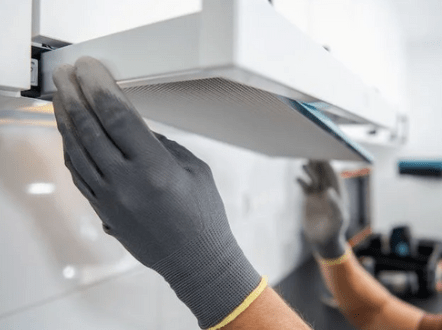Kitchen extraction systems play a vital role in keeping cooking spaces clean, safe, and comfortable. Whether you're running a busy restaurant or cooking daily meals at home, the hidden dangers of a neglected extraction system shouldn't be overlooked. In this guide, we'll walk you through everything you need to know about keeping your kitchen extraction system properly maintained.

The purpose of kitchen extraction is to remove cooking fumes, grease particles, and odours from the air. Over time, these systems collect grease and carbon deposits that not only reduce their efficiency but pose serious fire risks.
When airborne grease passes through an extraction system, it condenses and sticks to the surfaces inside ductwork, filters, and fans. This build up creates three major problems:

The required cleaning frequency depends on your kitchen type and usage patterns:
Home kitchen extraction systems, including cooker hoods and filters, should be cleaned every 3 to 6 months. This timeframe can vary based on:
According to UK Home Fire Safety Guidelines, one in ten UK homes experience cooker hood grease blockages due to irregular cleaning, increasing the risk of smoke and fire hazards.

Commercial kitchens must follow stricter standards as defined by the TR19 guidelines from the Building Engineering Services Association. These guidelines specify cleaning schedules based on kitchen usage:
This isn't just best practice, it's a legal requirement. Commercial kitchens that fail to maintain extraction systems according to these standards risk fines up to £5,000 or even temporary kitchen closure under environmental health regulations.

Grease is highly flammable, and build up in extraction systems creates a major fire risk. When a fire starts in a kitchen, the flames can quickly spread to the extraction system if it's coated with grease. This creates a chimney effect, allowing fire to rapidly travel through ventilation ducts to other parts of the building.
The risk of fire is so significant that insurance companies specifically require adherence to TR19 grease guidelines. Failing to follow these guidelines can void your insurance policy if a serious fire risk occurs.
Proper fire risk assessment should include regular inspection of kitchen extraction systems. This assessment helps identify potential hazards and implement measures for reducing fire risks throughout the premises.
Beyond fire safety, dirty extraction systems affect air quality. Without adequate ventilation, cooking fumes linger, which can:
An often-overlooked benefit of regular cleaning and maintenance is the impact on efficiency. Clean extraction systems:
Kitchens that follow regular extraction cleaning schedules often report a 25-30% reduction in energy usage due to improved airflow and fan performance, according to the Carbon Trust.
A complete kitchen extract system includes several components that require regular cleaning:
Filters are the first line of defence in your extraction system. They trap larger grease particles before air enters the ductwork. Most commercial kitchens use baffle filters (sometimes called maze filters) that need frequent cleaning, sometimes as often as weekly for busy kitchens.

The extraction hood or canopy collects cooking fumes before they pass through the filters. The underside and interior surfaces collect grease and should be included in regular cleaning schedules. For thorough cleaning, all visible areas should be degreased and sanitised.

Ductwork runs from the hood to the exterior of the building. In commercial kitchens, this ductwork can be extensive and is often hidden from view, making it easy to forget. However, it's in these ducts that grease builds up over time, creating significant fire risks if not properly maintained. Ductwork cleaning requires specialised equipment and should be part of your full cleaning schedule.

Extractor fans draw air through the system. Grease can accumulate on fan blades, reducing their efficiency and creating potential mechanical problems. Deep cleaning of these components helps maintain working quality and extends equipment life.

Homeowners can usually handle basic extraction cleaning:
Commercial kitchens should rely on professional cleaning services for several reasons:
Don't wait for problems to arise, look for these warning signs that you need a clean extraction system:

Professional kitchen extraction cleaning typically follows these steps:
Commercial kitchens must comply with several regulations regarding extraction cleaning:
Environmental health officers from local authorities can inspect commercial kitchens at any time, and inadequate cleaning can result in improvement notices, fines, or even closure orders.
Maintaining a clean kitchen extraction system delivers numerous benefits:

While regular professional cleaning represents an ongoing expense for commercial kitchens, it should be viewed as an investment rather than a cost. Consider:
For domestic kitchens, the cost is primarily your time for regular cleaning, with perhaps occasional professional servicing for the full system.
When selecting a company to clean your commercial kitchen extraction:
A widely accepted standard for cleaning services is membership in professional trade organisations. This helps ensure that you're dealing with reputable companies who follow best practice guidelines.
One of the primary goals of kitchen extraction cleaning is reducing fire risks. Regular maintenance helps:
Regular maintenance of kitchen extraction systems goes beyond just cleaning. It includes:

Whether you're running a busy commercial kitchen or cooking at home, regular extraction cleaning is essential for safety, efficiency, and compliance. By understanding the requirements and implementing a proper cleaning and maintenance schedule, you can:
Don't wait until problems arise. Establish a regular cleaning schedule appropriate for your kitchen type and usage patterns, and stick to it diligently.
For commercial kitchens in particular, remember that professional cleaning isn't just recommended, it's required by regulatory bodies and crucial for your insurance validity.
Need help establishing a cleaning schedule or arranging professional cleaning for your kitchen extraction system? Cleanup Team specialises in kitchen extraction cleaning for both commercial and domestic properties. Contact us today for a free quote and ensure your kitchen stays safe, clean, and efficient.